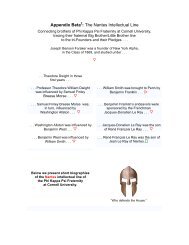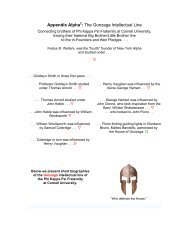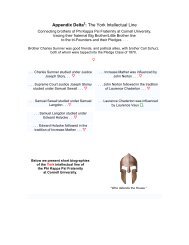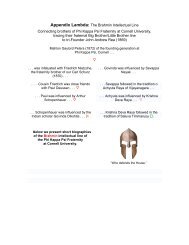Gondar - Phi Kappa Psi
Gondar - Phi Kappa Psi
Gondar - Phi Kappa Psi
Create successful ePaper yourself
Turn your PDF publications into a flip-book with our unique Google optimized e-Paper software.
while living alone in a cave than when I was living with scholars. What I wrote in<br />
this book is very little; but in my cave I have meditated on many other such<br />
things."<br />
After the death of the king, his son Negus Fasiladas (r. 1632-1667), a firm<br />
adherent of the Ethiopian Orthodox church, took power. He expelled the Jesuits,<br />
and extirpated the Catholic faith in his kingdom in 1633. In this new situation,<br />
Yacob left his cave and settled in Enfraz. He found a patron, a rich merchant<br />
named Habtu, and married a maidservant of the family, whose name was Hirut.<br />
"... she was not beautiful," confessed Yacob, "but she was good natured,<br />
intelligent and patient." The monastic life did not appeal to Yacob, who stated<br />
that, "the law of Christians which propounds the superiority of monastic lifeover<br />
marriage is false and can’t come from God." He also rejected polygamy because<br />
"the law of creation orders one man to marry one woman."<br />
Returning to his former profession, Yacob became the teacher of Habtu's<br />
two sons. At the request of his patron's son Walda Heywat, Yacob wrote his<br />
famous Treatise, in which he recorded his life and thoughts. The self-portrait was<br />
completed in 1667. Yacob's basic method, which he applied to his investigation,<br />
was the light of the reason.<br />
Although Yacob is essentially a religious thinker, he defends his belief on<br />
rational grounds and rejects subjectivism. "God created us intelligent so that we<br />
can meditate on his greatness," Yacob wrote. Truth can be discovered by the<br />
power of analytical thinking: "... truth is one." But Yacob also believes that truth is<br />
immediately "revealed" to the person who seeks it. "Indeed he who investigates<br />
with the pure intelligence set by the creator in the heart of each man and<br />
scrutinizes the order and laws of creation, will discover the truth."<br />
Following in the footsteps of great church fathers, Yacob applied the idea<br />
of the first cause to his proof for the existence of God. "If I say that my father and<br />
my mother created me, then I must search for the creator of my parents and of<br />
the parents of my parents until they arrive at the first who were not created as we<br />
[are] but who came into this world in some other way without being generated."<br />
However, the knowability of God do not depend on human intellect, but "Our soul<br />
has the power of having the concept of God and of seeing him mentally. God did<br />
not give this power purposelessly; as he gave the power, so did he give the<br />
reality."<br />
Little is know of Yacob's later life but Enfraz, where he lived harmonious<br />
and happy family life, remained his home town for the next twenty-five years. He<br />
also saw that husband and wife are equal in marriage, "for they are one flesh and<br />
one life." Yacob died in 1692. Walda Heywat, his successor, published later an<br />
treatise, in which he followed Yacob's lines of thought. The first scholar, who<br />
introduced Yacob's thought to the English-speaking world, was Professor Claude<br />
Sumner, who moved from Canada to Ethiopia in the 1950s. Summer proved that






